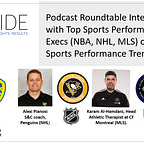This week we had the honor to interview a group of sports performance experts.
Pierre Barrieu, Head Fitness coach & Performance analyst at Leeds United FC (Premier League)
Karam Al-Hamdani, Head Athletic Therapist at CF Montreal (MLS).
Alexi Pianosi, Strength and conditioning coach for the Pittsburgh Penguins (NHL).
📝Show Notes: Through this interview, we touched on the growing popularity of cryo chambers, and the pros and cons there. Then we discussed the pros and cons of cooling/heating therapy solutions (GameReady..). We also touched on the growing appetite for research papers and studies among pro teams. Lastly we talked about Serena’s retirement at the US Open this year.
🚀Best Quotes: Here are some of the key discussion points and best quotes from our conversation with Pierre, Karam and Alexi.
On the growing popularity of cryo chambers, and the pros and cons of using such technology:
Alexi Pianosi:
“ I'm a big proponent of cryo chambers. I think they can be very effective if your goal is to reduce inflammation, and restore some balance to the autonomic nervous system”.
“We have a cryo unit in Pittsburgh. Players do enjoy using it post practice once their day is complete. And anecdotally guys will respond with “I had a great nap in the following afternoon”, and it's almost like a big lull and a big exhalation after they get home and sit down on the couch and they have a hard time getting up. (…) I think cryo chambers, like any other good modalities, have their place at the right time for the right person and can be really effective”.
Pierre Barrieu:
“I've tried cryo chambers 10, 15 years ago. It was when they came out (…) I thought that there were some very positive effects. I think it's very useful for goalkeepers especially if the players have been battered and bruised. This will help them recover. It is also a compliment to all the recovery techniques”.
“So in summary, I always say that the cold bath would cool you to the core and then the cryo chamber would help you recover on the periphery (..) But the one thing with cryo chambers is that it's expensive to acquire and it's expensive to maintain”.
Karam Al-Hamdani:
“Cryotherapy is part of a system. And so if you have optimal recovery strategies and it fits within that system, then all the better, but if you don't believe in it, then it won't serve its purpose”.
On the pros and cons of using cooling and heating therapy:
Karam Al-Hamdani:
“We are very big on GameReady, and we are also very big on using cold tubs. I have nine GameReady units within our facility. A lot of times we'll have players who had a heavy session. So what they like to do is that they like the quad attachments and they will have two hoses attached to the GameReady unit. And then they'll do both quads and hamstrings after a heavy session outside. And whether it has a positive effect or not on them, just the cooling effect after a hot day is always good for them”.
Alexi Pianosi:
“We used GamReady as well .I think it depends on where you are in the adaptation process. For us if we're playing games on a back-to-back night with some travel in between, and we know guys aren't gonna be recovered in 16 hours when they have to play again. So reducing inflammation with cold or with compression can be a really good thing”.
“But if we're in the preseason or if we know we have a certain amount of time for that inflammation to run its course in a proper and appropriate way to create adaptation, then I think GameReady or something like that could actually be counterproductive”.
On the growing appetite for research papers and studies among pro teams:
Alexi Pianosi:
“Running scientific trials is difficult in general, let alone on each and every specific thing that you want to learn a little bit about. So sometimes the research is lacking, not because the idea is poor or there's a good historical precedent for such a concept, but just because by the nature of funding or availability or logistics, they're unable to study it. So I don't always necessarily need a randomized gold standard trial to say “I will sign off on this nutritional intervention or this training program”, but I think it is also incumbent that the idea or concept can be grounded in good science”.
“If I saw that this technology works with this subgroup, I therefore think that it could theoretically work for my subgroup or that this nutritional intervention was shown in this small study to be very beneficial”.
“So it's always great to have scientific evidence, but I think it's also incumbent to recognize that just because the scientific evidence isn't there doesn't mean that the idea or the concept or the intervention is not”.
Pierre Barrieu:
“I don’t know if doing research and studies is a requirement in Europe. This is not what I've been experiencing here. I know that the context is such here that the club at the high level will definitely have more PhD students just because of the culture in England. I would also say that when it comes to sport science, having larger staff and more students that have the ambition of working with professional clubs and especially in football, is more common here”.
“I don't go by research maybe as much as I should because also I'm 50 now and I've seen a few things come and go”.
“Most of the time, when it comes to technologies, we just get them and we do a random trial and then we talk to colleagues, and consult with other professionals and then we make up our mind”.
On Serena Williams’ retirement and her legacy:
Karam Al-Hamdani:
“She had to overcome a race and color barrier. Then she had to overcome a male versus female barrier. And then on top of those two huge barriers, she had to overcome being in the shadow of her sister, Venus, the older one and then she won multiple championships after her sister and then she got recognized as one of the best athletes of her generation in the world”.
“But there's one of her quote that really resonates with me.
She said, “when you're a champion, you're always a champion. So behave like one”.
Pierre Barrieu:
“You have to admire and respect her longevity. I don't think we have seen anything like this before. In the world of tennis, on the men's side, we have a big three. But Serena, on the other end, has been around for a while and she's been more dominant”.
“So that's obviously something that we've been able to witness. And the fact that she came with her sister, this is not something we see very often as well. And I have to say, she had an easier way to act as a champion when she was really on top. And when she faced some adversity at times, she had a behavior that honestly, for me, I was disappointed sometimes (..) But I'm glad to have seen her play all these years, And I think she's going at the right time, which is not easy”.
“So one day I bumped into her and she was very reserved. I wouldn't say shy or introverted, but this is where you see through of people. Now oftentimes you see them outside of the environment. And to me, this was great to see that she was very genuine, normal, and respectful outside of the code because sometimes, and I have been on the ATP for a few years, sometime it's not the case for some of these champions. She's definitely a fighter and competitor. And even if, like I said, she had some bad reactions in the past, I thought she's a very respectable person”.
Alexi Pianosi:
“I think she was an unbelievable athlete to watch for so long. And I remember a conversation when Andy Murray was getting interviewed, and I think it was after a Wimbledon match, and they talked about, “do you think she's the greatest female tennis player?” And he's just stopped the journalist and said tennis player. Andy Murray has always been very forthcoming and honest on things like that, but I think she's one of the greatest tennis players of all time”.
“She never played against the men. The men never played against the women. That's just the nature of tennis, but I think her impact on the sport, empowering young women all across the world, really with her game, where she was doing it with a little bit of a different style too, where she was a little bit more aggressive, a little bit more physical as well, I think that was a little bit trail blazing for her”.
“Anytime you get a chance to watch an elite athlete like that, one of the greatest of all time, if not the greatest, I think that something we always take them for granted until it's gone”.
You may also like:
⭐ 🛰️ Outdoor GPS Market: Key Vendors, Trends, Recommendations to Pro Teams
⭐ ⌚ Upside: HRV Ecosystems Analysis: Latest Research, Trends, Key Vendors & Where We are Heading
🔥Upside: AMS Ecosystem Analysis: Key Trends, Vendors and Recommendations to Teams
⭐Upside: Top 12 Emerging Sports Performance Startups to Watch in 2H22
🔥 Upside Chat: Dave Hancock, CEO, Apollo (Leading Athlete Management Systems (AMS) vendor)
⭐Sports Performance Roles & Best Practices (Head of Performance, Head Athletic Trainer..)











